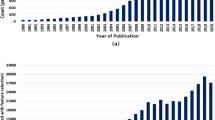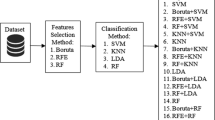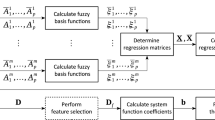Abstract
In this paper, we design a fuzzy rule-based support vector regression system. The proposed system utilizes the advantages of fuzzy model and support vector regression to extract support vectors to generate fuzzy if-then rules from die training data set. Based on the first-order linear Tagaki-Sugeno (TS) model, the structure of rules is identified by the support vector regression and then the consequent parameters of rules are tuned by the global least squares method. Our model is applied to the real world regression task. The simulation results gives promising performances in terms of a set of fuzzy rules, which can be easily interpreted by humans.
Similar content being viewed by others
References
N. Cristianini, J. Shawe-Taylor. An Introduction to Support Vector Machines and Other Kernel-based Learning Method [M]. Cambridge, U.K.: Cambridge University Press, 2000.
C. Cortes, V. Vapnik. Support-vector networks [J]. Machine Learning, 1995,20(3):273–297.
T. B. Trafalis, H. Inco. Support vector machine for regression and applications to financial forecasting [C] // Proc. of the IEEEINNS-ENNS Int Joint Conf. on Neural Networks. Piscataway, NJ: Institute of Electrical and Electronics Engineers Inc. 2000,6:348–353.
D. A. Linkens, C. Min-You. Input selection and partition validation for fuzzy modeling using neural network [J]. Fuzzy Sets and Systems, 1999,107(3):299–308.
C. Mu-Song, W. Shinn-Wen. Fuzzy clustering analysis for optimizing fuzzy membership functions [J]. Fuzzy Sets and Systems, 1999, 103 (2):239–254.
J. S. R. Jang, C. T. Sun, E. Mizutani. Neuro-Fuzzy and Soft Computing; A Computational Approach to Learning and Machine Intelligence [M]. Xi’an, China: Xi’an Jiaotong University Press and Prentice-Hall, 1997.
T. Takagj, M. Sugeno. Fuzzy identification of systems and its applications to modeling and control [J]. IEEE Trans, on Syst., Man, Cybern., 1985,15(1):116–132.
V. Vapnik. The Nature of Statistical Learning Theory [M]. New York: Springer-Verlag, 1995.
A. J. Smola, B. Scholkopf. A tutorial on support vector regression [R]. Neuro COLT Technical Report NC - TR - 98 - 030, Royal Holloway College, University of London, UK, 1998.
L. Wang,J. Mendel.Fuzzy basis functions, universal approximation, and orthogonal least-squares learning [J]. IEEE Trans. on Neural Networks, 1992,3(5):807–814.
M. Sugeno, T. Yasukawa. A fuzzy-logic-based approach to qualitative modeling [J]. IEEE Trans. on Fuzzy Systems, 1993,1 (1): 7–31.
W. Chan, K. Cheung, et al. On the modeling of nonlinear dynamic systems using support vector neural networks [J]. Engineering Application of Artificial Intelligence, 2001,14(2): 105–113.
A. F. Gomez-Skarmeta, M. Delgado, M. A. Vila, About the use of fuzzy clustering techniques for fuzzy model identification [J]. Fuzzy Sets and Systems, 1999,106(2): 179–188.
Author information
Authors and Affiliations
Additional information
This paper was supported by the National High Technology Research and Development Program of China 863 program (No. 2002 AA412010) , the Technology development Program of the Science and Technology Ministry of China (No. 2003EG113016), and the key discipline construction program of Beijing Municipal commission of education.
Ling WANG is a Ph. D. candidate at the Institute of Information Engineering, University of Science and Technology, Beijing. Her current research areas include artificaial intelligent, machine learning and data mining.
Zhichun MU is a Professor at the University of Science and Technology, Beijing. His research interests include the artificial intelligent control and machine learning.
Hui GUO is a Ph.D. candidate at the Institute of Information Engineering, University of Science and Technology Beijing. His current research areas include amchine learning and data mining.
Rights and permissions
About this article
Cite this article
Wang, L., Mu, Z. & Guo, H. Fuzzy rule-based support vector regression system. J. Control Theory Appl. 3, 230–234 (2005). https://doi.org/10.1007/s11768-005-0040-3
Received:
Revised:
Issue Date:
DOI: https://doi.org/10.1007/s11768-005-0040-3




